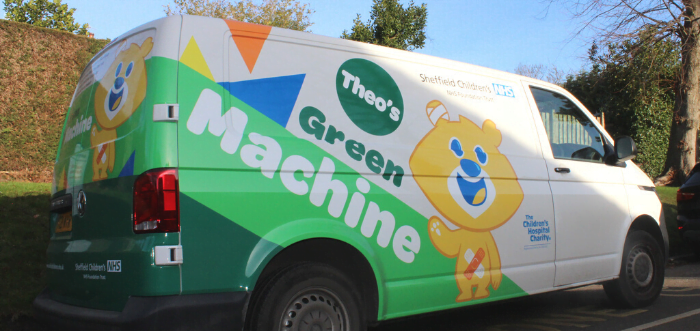Help to transform our extraordinary hospital into something even better.
- Refine search:

It’s Clean Air Day 2023 and Sheffield Children’s colleagues are working hard to make our air cleaner for people now and in the future.
There are a number of pieces of work happening at Sheffield Children’s, including an amazing award-winning inhaler recycling scheme you can read about on our website:
Inhalers are a major source of greenhouse gasses. However, the impacts can be reduced by ensuring that the correct product is prescribed for each patient and the inhalers are disposed of correctly. Currently the most environmentally friendly way to dispose of inhalers is to return them to a pharmacy for incineration, which significantly degrades the harmful greenhouse gases they still contain, but they aren’t harmful to people who use them.
Dr Sam Flowers, Clinical Lead for Sustainable Asthma Prescribing for the South Yorkshire and Bassetlaw Children and Young People’s Asthma Transformation Programme, said: “We are proud at Sheffield Children’s to be leading the way on greener inhaler disposal. Returning used or unwanted inhalers to a pharmacy is a simple and effective way to help protect our planet for this and future generations.”
We have also switched the Trust’s fleet of estates vans to electric, increased the amount of cycling parking facilities and are helping enthusiastic colleagues to loan or buy e-bikes. We also have our own air quality monitor outside of the hospital to monitor the local air quality and to help communicate the importance of air quality to visitors.
John Williams, Sheffield Children’s Deputy Chief Executive and Chief Finance Officer, said: “These are all great initiatives which will help us towards our ambition to be in the top 10 greenest NHS Providers in the country, and the NHS England target to have carbon emissions net zero by 2040.
“They also contribute to the delivery of our Sustainable Travel Plan, launched last year, which aims to encourage as many of our colleagues and visitors to access our sites by greener and more sustainable means where it is feasible for them to do so.
“We are also mindful of the health inequalities many people encounter in their day-to-day lives and recognise the challenges around social determinants of health such as cost of living, housing, proximity to busy roads and education that can make accessing clean air more difficult. It’s not a level playing field and we are working to tackle health inequalities alongside our green plan initiatives.”
Hearing from our colleagues
For Clean Air Day 2023, we asked Dr Sonal Kansra, Consultant in Paediatric Respiratory Medicine, and Dr Sam Flowers for their views about the impact of air quality on children now and in the future.
They want to ‘make smoke invisible’ and here’s what they told us.
What are we seeing?
“In our clinical work we look after children with a range of respiratory conditions like asthma. It is now recognised that breathing in poor quality or polluted air can trigger these conditions.
“In population-level studies it is clearly evident that children growing up in areas with more pollution have poorer lung health and smaller lungs. Air pollution is also associated with many other diseases that may affect children now or when they are older such as heart disease, strokes and cancer.
“It is very clear to us that the best elixir for children’s lungs is clean air. Unfortunately, children continue to be exposed to poor quality air for a variety of reasons from vehicle and industrial emissions to second hand smoke from cigarettes, and damp and mould in poor housing.”
What can we do?
“On Clean Air Day let’s take small steps towards improving the quality of air children breathe in. By walking or cycling short distances we will keep our personal footprint from emissions down and contribute to cleaner air. If you do need to drive, remembering not to idle engines when stationary is a simple but very effective way to reduce emissions. Keeping homes well ventilated will help improve the quality of air children breathe in indoors as will choosing fragrance free products to use at home when out shopping.
“Checking local air pollution levels using various apps and planning outdoor exercise for a time when levels are lower will reduce exposure too.
“The professionals looking after children have an important role to advocate that children breathe in only clean air but we need everybody to play their part in achieving this.
“Personally, we’d like to work towards an environment where we make all smoke invisible to the next generation, smoke from cigarettes and vapes, to cars; making a start at our own personal level and advocating for a bigger change. We owe it to our children to clean up our act on air pollution.”
Other helpful resources and information:
Sheffield Children’s Green Plan
By continuing to use the site, you agree to the use of cookies. more information
The cookie settings on this website are set to "allow cookies" to give you the best browsing experience possible. If you continue to use this website without changing your cookie settings or you click "Accept" below then you are consenting to this.